 Petzlover
Petzlover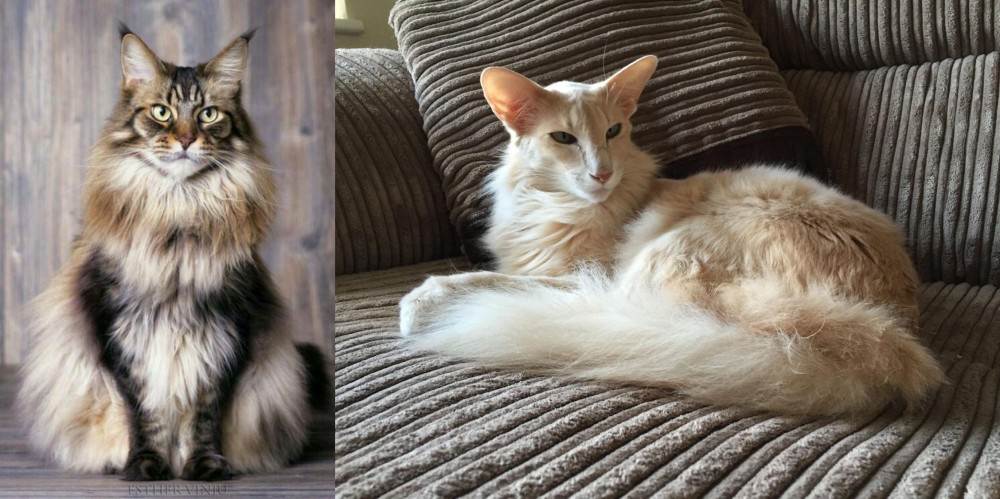 American Longhair is originated from United States but Oriental Longhair is originated from United Kingdom. Both American Longhair and Oriental Longhair are having almost same weight. American Longhair may live 3 years more than Oriental Longhair. Both American Longhair and Oriental Longhair has same litter size. Both American Longhair and Oriental Longhair requires Moderate Maintenance.
American Longhair is originated from United States but Oriental Longhair is originated from United Kingdom. Both American Longhair and Oriental Longhair are having almost same weight. American Longhair may live 3 years more than Oriental Longhair. Both American Longhair and Oriental Longhair has same litter size. Both American Longhair and Oriental Longhair requires Moderate Maintenance.
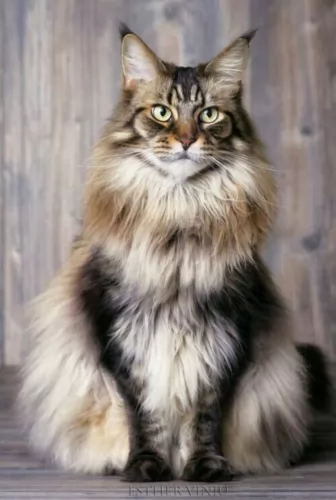 The handsome American Longhair cat is thought to be the result of attempts by breeders to have a cat that portrayed some Persian varieties.
The handsome American Longhair cat is thought to be the result of attempts by breeders to have a cat that portrayed some Persian varieties.
American shorthairs have characteristics and looks from both breeds. The American Longhair, although it comes from champion bloodlines, isn’t actually recognized by larger cat organizations.
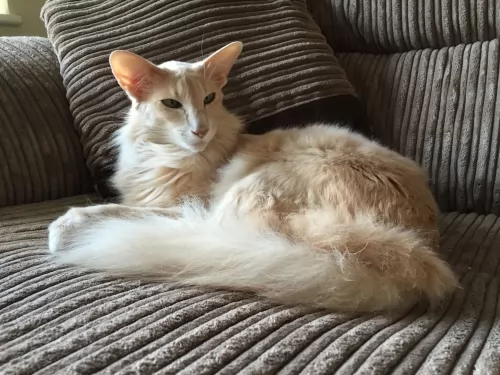 Your Oriental Longhair cat has his foundations in the Siamese breed. The Siamese came from Thailand to the UK in the 1800s.
Your Oriental Longhair cat has his foundations in the Siamese breed. The Siamese came from Thailand to the UK in the 1800s.
Sometimes a litter of Siamese kittens produced a long-haired variety but in the 1950s breeders started honing in on these longer haired Siamese cats.
Various crossings took place and Oriental Shorthairs came about. By breeding these Shorthairs with Balinese cats, the Oriental Longhair came about in the 1970s.
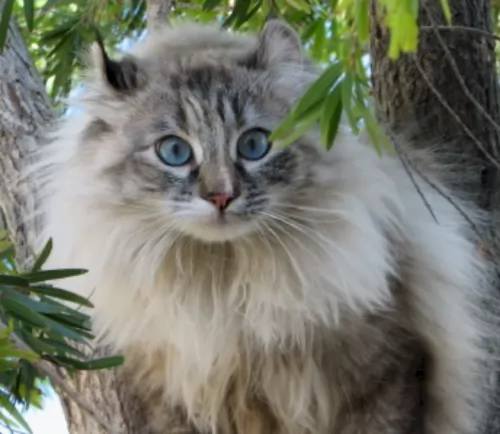 You’ll find that there are quite a few American Longhairs that have the snub nose of the Persian cat which is part of its ancestry.
You’ll find that there are quite a few American Longhairs that have the snub nose of the Persian cat which is part of its ancestry.
This is a well-muscled, medium to large sized athletic cat with a thick double coat of many colors and patterns that sheds fairly heavily.
This isn’t a particularly vocal cat, but in true cat-fashion, it is independent and doesn’t require a lot of attention.
This cat will make a nice companion for older people and it is calm enough to enjoy a leisurely stroll outdoors with a harness on. They’re adaptable to different situations, but the American Longhair isn’t the ideal choice for children as it isn’t your playful, lover of noise and games type of cat, preferring the attention of other animals.
They love going into barns and being buffeted and licked by the cows and other barnyard animals.
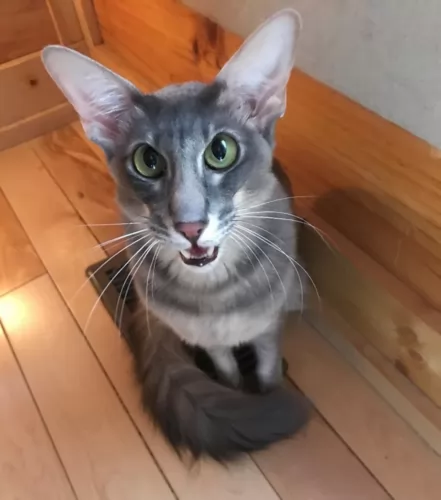 The Oriental Longhair is a medium-sized cat with a fairly long, muscular, lean body. The Oriental Longhair actually resembles the Siamese cat.
The Oriental Longhair is a medium-sized cat with a fairly long, muscular, lean body. The Oriental Longhair actually resembles the Siamese cat.
They also come in an outstanding array of colors and patterns with the coat being long and silky. The coat can be a solid color but you can also find tabby-type coats as well as tipped coats. The cat doesn’t have an undercoat and coat lies fairly flat against the body. You will also hear it being referred to as a semi-longhair.
The tail is attractive and forms quite a bushy plume.
The Oriental Longhair cat has almond-shaped green eyes. If you see the white Orientals, they can have green or blue eyes. They can also be odd-eyed.
These cats are intelligent, curious, and good-natured and they love to talk. Therefore it is important that such a cat breed have a home where there is plenty of company.
They’re active cats too, loving to play and bound and leap. He'll want to willingly join in with some of your games. The cat will certainly need some exciting toys to keep him occupied.
They are loyal cats and become loving and devoted to their human family, getting on well with children in the home as well as other pets.
They don’t like being left alone at all and will prefer to have company, even if it is from another pet.
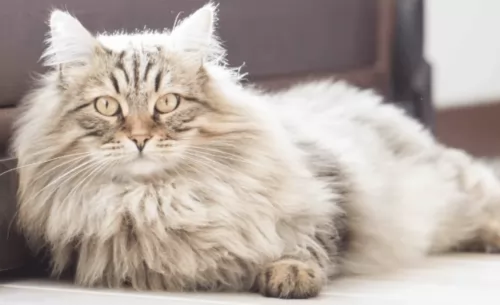 Your American Longhair is an easy-going, friendly social cat that doesn’t demand a lot from his human owners.
Your American Longhair is an easy-going, friendly social cat that doesn’t demand a lot from his human owners.
These cats are intelligent too and you can even teach them a trick or two. They enjoy the company of their humans and will even follow you around.
Bringing one into your home promises to be a rewarding pet-ownership experience.
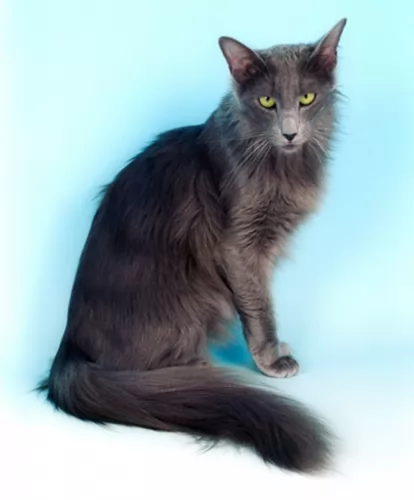 Your Oriental Longhair is such a friendly, lively cat and he makes a splendid companion. It is an inquisitive cat and likes to be part of the activity in the household.
Your Oriental Longhair is such a friendly, lively cat and he makes a splendid companion. It is an inquisitive cat and likes to be part of the activity in the household.
He is a social, talkative cat and has always got a lot to say/ They love the attention of their human family and don’t like being separated too long from them.
When you get one of these cats, you get both an entertainer and a friend.
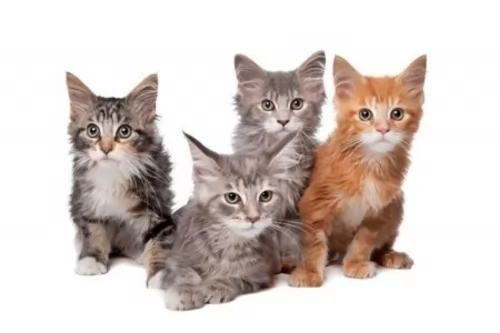 The American Longhair doesn’t have many health concerns and you can expect him to live up to 18, 19 or 20 years of age with good care.
The American Longhair doesn’t have many health concerns and you can expect him to live up to 18, 19 or 20 years of age with good care.
There are some American Longhairs that come with that shortened face of the Persian, and this may mean him battling with breathing problems.
Also, be aware of Polycystic kidney disease where you get cysts that form in the kidneys and which can become larger over time and eventually affect kidney function, leading to kidney failure.
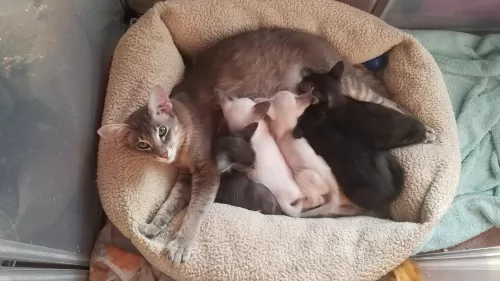 The Oriental Longhair is generally considered a healthy breed. Because the cat can be prone to some inherited conditions, it is always a wise move to buy a kitten from a reputable breeder.
The Oriental Longhair is generally considered a healthy breed. Because the cat can be prone to some inherited conditions, it is always a wise move to buy a kitten from a reputable breeder.
A couple of these diseases to look out for include Progressive Retinol Atrophy which is a degenerative condition that can lead to blindness.
Also, look out for periodontal disease which is common in many cat breeds.
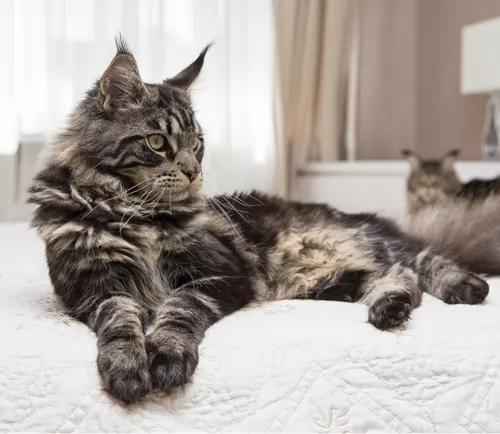 The long coat of the American Longhair will require some brushing to keep it shiny and smooth and free from dust but also to remove all those loose hairs.
The long coat of the American Longhair will require some brushing to keep it shiny and smooth and free from dust but also to remove all those loose hairs.
Make sure your cat’s food and water dishes are in an appropriate spot and keep them separate from your cat’s litter box. House train your cat immediately on how to use a litter box. Keep the litter box clean and rake up your cat's droppings regularly and dispose of them.
Before you get a cat, know that they scratch. It is normal for a cat. Provide your cat with a scratching post as well as climbing equipment such as a cat climbing tree.
Always feed your cat a meat-based diet, after all, cats in the wild are carnivores. There are some ingredients that a cat must have and they require certain amino acids found in meat-based proteins or else they could become ill.
The top quality cat foods provide cats with all the nutrients they need to keep them healthy. There are some cat owners who opt to feed their cats home-prepared meals because then they know exactly what’s going into their beloved pets food.
There are other cat owners who choose to provide their pet with a raw diet because they believe that this comes close to the cat's natural diet in the wild.
Always speak to your vet if you are in any way uncertain about the best foods for your cat. He should always have access to fresh cool water.
Check your cat for problems such as parasites such as ticks and fleas. You will also need to have your cat checked for worms. Your vet can diagnose worms with a physical exam. If it is discovered that your cat does have worms, the vet will recommend some safe, effective medications for your pet.
If you are able to, get your cat regular veterinary examinations to ensure he is always in tip-top condition.
Have your cat spayed or neutered to prevent unwelcome kittens in a world where there are just too many unwanted kittens. These procedures can have health benefits for your cat as well.
American Longhairs are lively playful cats so give your cat toys to play with to ensure mental stimulation.
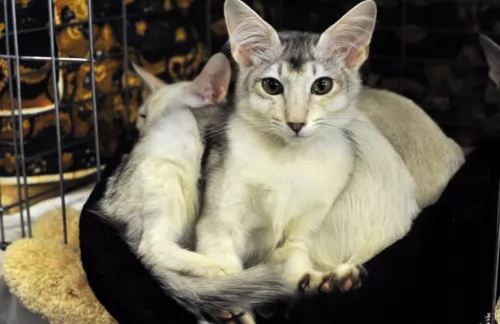 This is a slim cat and you can easily tell when he has put on weight. Be very careful with how much you feed your cat and what you feed him.
This is a slim cat and you can easily tell when he has put on weight. Be very careful with how much you feed your cat and what you feed him.
Cats are carnivores and you need to ensure that his diet is rich in meaty ingredients. These cats have long slim legs and extra weight can put pressure on the cat’s joints. Keep your cat lean and healthy. If in any doubt about diet for your cat, speak to your vet, Always ensure a bowl of fresh, cool water.
Prepare to have a cat included in your family. Invest in food and water bowls, a cat bed, grooming brushes, toys, climbing tree, scratching post and litter box. A cat box for transporting your pet to the vet is also a good idea.
The Oriental Longhair loves to leap up into high areas so he will need a climbing tree. Try to get your cat out into the sunshine where possible and allow him to climb into a tree.
The cat’s medium- to long hair will require brushing once or twice a week. When you brush your pet gently but purposefully, he loves it and it becomes a bonding session.
Provide your cat with a litterbox and make sure to clean out the box every day. You can do that by buying a small plastic rake at the pet shop and it keeps the litter nice and even for your pet.
Have your cat neutered or spayed to prevent unwanted kittens.